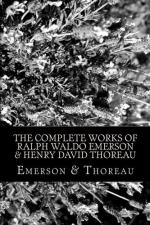|
This section contains 5,738 words (approx. 20 pages at 300 words per page) |

|
SOURCE: “Thoreau as Poet,” in The Cambridge Companion to Henry David Thoreau, edited by Joel Myerson, Cambridge University Press, 1995, pp. 57-70.
In the following essay, Witherell finds that Thoreau's poems are mainly of interest for what they tell us about Thoreau's life and his development as an artist.
In the Transcendentalist view, especially as articulated by Ralph Waldo Emerson in “The Poet” and in Nature, the poet's responsibility is essentially religious—by a finer organization, a greater sensitivity to truth and beauty, the poet perceives and interprets the eternal realm that stands behind the apparent reality of the material world. Thoreau aspired to this sacred and powerful vocation at least from the time he began keeping his Journal in October 1837. Emerson indicates that poetry is defined by the strength of its internal source rather than by the regularity of its external form,1 but as a young man just...
|
This section contains 5,738 words (approx. 20 pages at 300 words per page) |

|


